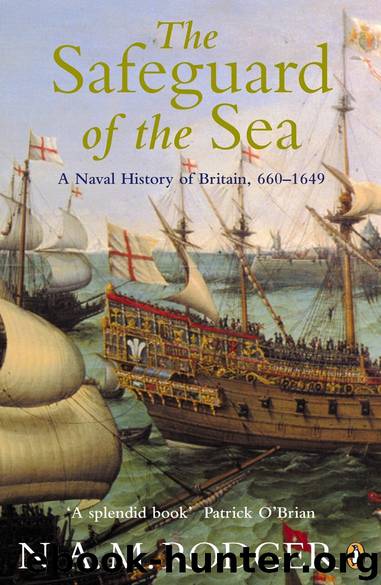The Safeguard of the Sea: A Naval History of Britain 660-1649 by N A M Rodger

Author:N A M Rodger [Rodger, N A M]
Language: eng
Format: epub
Tags: Great Britain, History, Medieval, Military, Naval, Non-Fiction, Renaissance, Ships & Shipbuilding, Transportation
ISBN: 9780141912578
Google: FNKKupCv4VwC
Amazon: B002XHNMMG
Publisher: Penguin UK
Published: 2004-10-06T23:00:00+00:00
TWENTY-FOUR
No More Drakes
Operations 1603–1630
The accession of James VI of Scots to the throne of England in 1603, and the peace with Spain which followed soon after, left England and the English Navy more securely at peace than they had been for nearly a century. (‘English Navy' seems to be the correct usage: King James favoured the term ‘Great Britain’, but his two kingdoms were constitutionally quite independent, the Scottish fleet had disappeared in the civil wars of the mid-century, and the Navy Royal was entirely financed from English revenue.) No great power menaced England or Scotland. Spain was still fully occupied with her many other enemies, France was barely recovering from the civil wars, Scotland's ally Denmark protected the Baltic trades. The new king was himself a man of peace; his upbringing in a weak and unstable kingdom had taught him the risks of war and men of war, at home and abroad. James was a learned and in many ways an intelligent man, keenly interested in politics, and much better informed about foreign affairs than most of his English subjects, but not interested in administrative detail.
James's peaceful accession was managed by the Cecil–Howard interest which now dominated English politics. This at once introduced a tension, for King James disliked pirates as much as any other men of violence, but Sir Robert Cecil discreetly, and Lord Nottingham openly in his official capacity of Lord Admiral, were the effective heads of the privateering interest which had grown and gained so much during the war. The great merchants of London redirected their peacetime energies into the armed trading for which their ships and their experience were so suitable: in the Mediterranean, as the Levant Company, in the East, as the new East India Company, and everywhere in Europe where neutral merchantmen able to defend themselves stood to capture trade from the belligerents. In many minor ports, however, especially in the West Country, men had no alternative trade to take up, but continued in their accustomed ways. The private enterprises of the Elizabethan naval system, sometimes an embarrassment even in wartime, were distinctly unwelcome to a soverign committed to peaceful coexistence. As a legacy of war the government faced a serious problem of piracy everywhere around the British Isles, even in the Thames. A Dutch ship, aground at low water at Gravesend, was robbed by pirates who took off their shoes and stockings and waded out to her – and it was not only obscure merchantmen which suffered.1 In 1603 the Venetian ambassador was robbed by English pirates on his way to England; in 1614 King James's brother-in-law Christian IV of Denmark suffered likewise.2 Nottingham as Lord Admiral, though only once caught taking bribes to favour piracy, was deeply ambiguous towards it.3 ‘Your lordship shall see there shall be no fault in me, but I do not look to see England or France free of pirates; they are relieved in some ports or creeks, and what mine officers can do they shall.’4 But many of them did not.
Download
This site does not store any files on its server. We only index and link to content provided by other sites. Please contact the content providers to delete copyright contents if any and email us, we'll remove relevant links or contents immediately.
| Africa | Americas |
| Arctic & Antarctica | Asia |
| Australia & Oceania | Europe |
| Middle East | Russia |
| United States | World |
| Ancient Civilizations | Military |
| Historical Study & Educational Resources |
The Radium Girls by Kate Moore(12033)
100 Deadly Skills by Clint Emerson(4929)
Rise and Kill First by Ronen Bergman(4792)
The Templars by Dan Jones(4690)
The Doomsday Machine by Daniel Ellsberg(4492)
The Rape of Nanking by Iris Chang(4217)
Killing England by Bill O'Reilly(4006)
Stalin by Stephen Kotkin(3970)
Hitler in Los Angeles by Steven J. Ross(3947)
12 Strong by Doug Stanton(3553)
Hitler's Monsters by Eric Kurlander(3344)
Blood and Sand by Alex Von Tunzelmann(3206)
The Code Book by Simon Singh(3193)
Darkest Hour by Anthony McCarten(3134)
The Art of War Visualized by Jessica Hagy(3012)
Hitler's Flying Saucers: A Guide to German Flying Discs of the Second World War by Stevens Henry(2757)
Babylon's Ark by Lawrence Anthony(2683)
The Second World Wars by Victor Davis Hanson(2528)
Tobruk by Peter Fitzsimons(2520)
